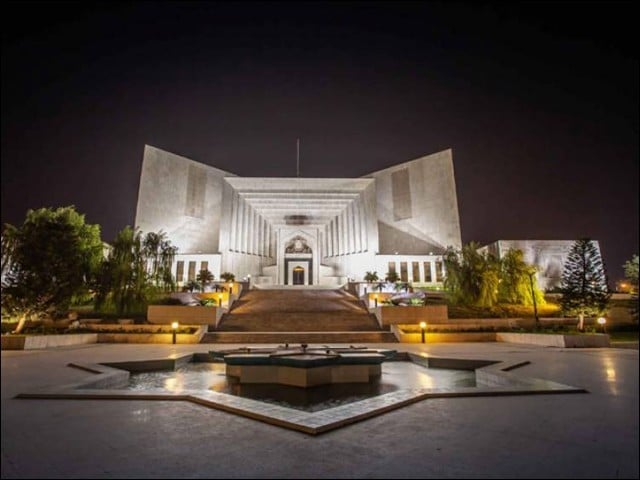SC to take up plea against NAB law verdict on 31st
Five-judge larger bench to hear govt’s intra-court appeal

A five-judge larger bench led by Chief Justice of Pakistan Qazi Faez Isa will on Oct 31 take up the federal government’s intra-court appeal against the majority judgement wherein the amendments to the National Accountability Ordinance (NAO) were declared unconstitutional.
The other judges on the bench are Justice Aminuddin Khan, Justice Jamal Khan Mandokhail, Justice Athar Minallah and Justice Syed Hasan Azhar Rizvi.
The appeal has been filed under the Supreme Court (Practice and Procedure) Act, 2023 against the striking down of the changes in the NAO made through the National Accountability (Second Amendment) Act, 2022.
The appeal is the first one to be filed under the Supreme Court (Practice and Procedure) Act’s Section 5 and the SC has issued notices to the lawyers involved in the matter.
A three-member committee comprising CJP Isa, Justice Sardar Tariq Masood, and Justice Ijazul Ahsan had approved the hearing of the intra-court appeal.
Under the Supreme Court (Practice and Procedure) Act, appeals are to be fixed for hearing within 14 days. The federal government had challenged the top court’s decision to declare the amendments to the National Accountability Bureau (NAB) law null and void on Oct 17.
A three-member bench of the SC, headed by former CJP Umar Ata Bandial and comprising Justice Ahsan and Justice Syed Mansoor Ali Shah, conducted a lengthy one-and-a-half years hearing on the NAB law amendments case.
In June 2022, PTI Chairman and former premier Imran Khan challenged the amendments to the NAB law in the SC, arguing that the tweaks would pave the way for public office holders to get away with white-collar crimes.
The PTI chief filed a constitutional petition against the amendments under Article 184 (3).
On Sept 15, the SC, in a 2-1 verdict, ordered the restoration of corruption cases against public office holders that were withdrawn after amendments were made to the country’s accountability law.
Read Shehbaz ‘regrets’ SC verdict in NAB amendments case
The then CJP Bandial and Justice Ahsan declared the PTI chief’s petition to be maintainable while Justice Mansoor disagreed with the majority verdict.
Declaring the amendments null and void, the top court ordered the reopening of all corruption cases worth less than Rs500 million that were previously closed against political leaders from various parties and public office holders.
Separately, the three-member committee, headed by the CJP, under the Supreme Court (Practice and Procedure) Act approved a seven-point policy on what kind of cases would be heard on a priority basis.
Sources said the cases, where a speedy decision was a legal requirement, would be fixed for hearing as early as possible. They added that tax and election dispute cases would be heard on a priority basis as well.
Pre-arrest bail and post-arrest bail cases will also be given priority. Criminal cases punishable up to 10 years in prison will be heard on a priority basis too. Besides, the sources said the cases with multiple applications against the same decision would also be given priority.
The apex court is determined to reduce the number of pending cases. It disposed of 2,440 cases in 20 working days in the month of October.
A total of 1,305 new cases were also registered in the SC during this period.



















COMMENTS
Comments are moderated and generally will be posted if they are on-topic and not abusive.
For more information, please see our Comments FAQ